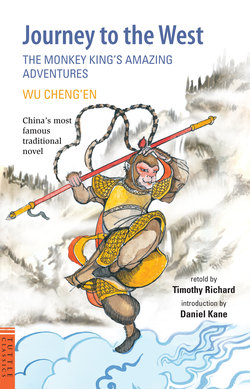Journey to the West

Реклама. ООО «ЛитРес», ИНН: 7719571260.
Оглавление
Wu Cheng'en. Journey to the West
Отрывок из книги
Timothy Richard traveled to China in 1868 as a Baptist missionary. When other missionaries were attempting to stamp out the popular local tales of gods and heroes such as Journey to the West, Timothy Richard championed them for the universal messages of spiritual challenge and growth they contain. He is also the author of Forty-five Years in China.
THE JOURNEY TO THE WEST is based on a true story of a Buddhist monk, Xuanzang, and his pilgrimage to India to acquire the “true scriptures.” Buddhism had entered China from India during the Han dynasty, mainly as the religion of foreign merchants. It spread amongst the Chinese population after the fall of the Han, during the so-called Period of Division, when China was in a constant state of chaos, war, and misery. “I teach suffering,” said the Buddha, “and how to escape it.” This was very different message from the statecraft of Han Confucianism or the mixture of mysticism, magic, and local religion Taoism had become, and one which found a deep response in the anarchy China had disintegrated into at that time.
.....
All of this strikes the modern reader as bizarre. Richard’s claims that he had discovered that Mahayana Buddhism was somehow much the same as Nestorian Christianity and that the author of The Monkey King’s Amazing Adventures was a closet Christian, attracted a good deal of criticism from less eccentric missionaries, in particular Bishop Moule. Richard later translated Ashvagosha’s Dacheng Qixinlun (The Mahayana Tradition on the Awakening of the Faith), further exploring his theories that Mahayana Buddhism was consonant with Christian teaching, and that recognition of this would lead to more rapid evangelization of the millions of Buddhists in China. Despite much public criticism, he persisted in this line of thought till the end of his life. His open approach to religious matters led to unexpected results. Kang Youwei, who acknowledged Richard’s influence on his thinking, dedicated himself in the later years of his life to the writing of The Book of Grand Unity, which curiously reflected many of Richard’s ideas: a world ruled by one central government, and the improvement of humanity through the spread of modern technology.
These comments are by no means meant to belittle Timothy Richard. Along with Hudson Taylor, he is regarded as one of the most influential and prolific missionaries of the non-conformist Christian tradition in China. Richard was closely involved with famine relief in North China as early as the 1870s. During the Boxer Rebellion (1900) some two hundred missionaries and their families were massacred in Shanxi. When the question of reparations was raised, the Prime Minister, Li Hongzhang, asked Richard for his advice. Richard suggested an indemnity of $500,000 be spent on establishing the Taiyuan University College (later Taiyuan University, now Taiyuan University of Technology). Richard was its Chancellor and Moir Duncan its first Principal. The Chinese government also instructed the Ministry of Foreign Affairs to consult with Richard and the Catholic Bishop of Peking on the improvement of relations between the government and the missionaries. Both men were awarded the title of First Grade Officials of the Qing Empire.
.....